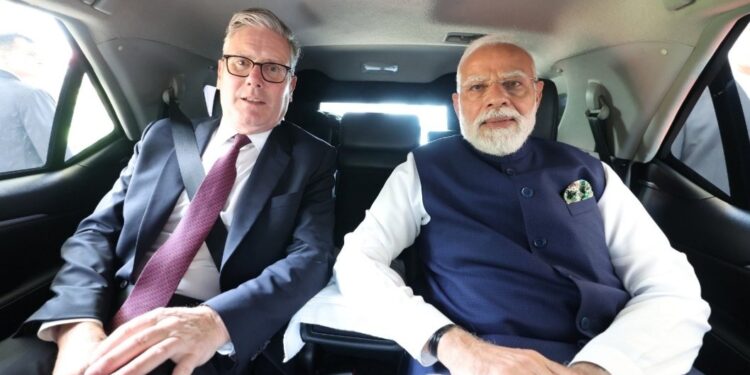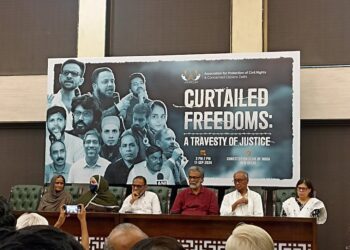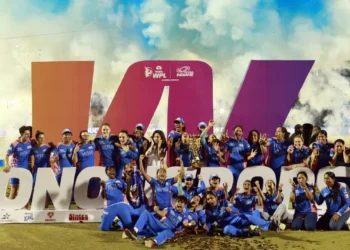India in the World
- On the 7th of October, as US President Donald Trump resumed his intention to take control of Afghanistan’s Bagram air base, the Russia-led regional platform that includes India, reiterated that any attempt to deploy “military infrastructure” in the country would be “unacceptable”. The statement is part of a joint declaration issued after the seventh meeting of the Moscow Format Consultations on Afghanistan, which called the international community to increase humanitarian aid .The Afghan Foreign Minister will travel to India directly from Moscow for the first ever bilateral high-level visit to India since the Taliban took over in 2021.
- On the 9th of October, Prime Minister Narendra Modi met his UK counterpart Keir Starmer, during the latter’s first visit to India. PM Starmer and PM Modi addressed the CEO Summit in Mumbai together and discussed defence and trade partnership between India and the UK. PM Modi also announced that nine UK colleges will open their campuses in India soon. Following three years of negotiations, PM Starmer finalised the trade deal with PM Modi in July 2025, saying it would bring “huge benefits to both of our countries” by boosting wages, raising living standards and bringing down prices for consumers.
- On the 9th of October, India and Australia explored the possibility of joint production of military hardware as Defence Minister Rajnath Singh and his Australian counterpart Richard Marles held talks in Canberra on further expanding the bilateral strategic ties. Mr. Singh described the meeting as “productive”, saying on social media that “we reviewed the full spectrum of India-Australia defence cooperation, including defence industry, cyber defence, maritime security and regional challenges”. The India-Australia defence engagements have expanded in the last few years, including in areas of capacity-building, training, ship visits, and bilateral exercises.
- On the 18th of October Pakistan Army Chief Field Marshal Syed Asim Munir warned India of a “decisive response” to even a minor provocation, telling Indian military leaders there is “no space for war in a nuclearised environment”. Speaking at the Pakistan Military Academy in Khyber Pakhtunkhwa about the recent military conflict between India and Pakistan, he claimed Pakistan’s armed forces had demonstrated “remarkable professionalism” and “far-reaching capabilities” by “neutralising” all threats and emerged “victorious” against a “numerically superior adversary”. He alleged India of using terrorism as a weapon to destabilise Pakistan and warned that all “proxies” using Afghan soil would be “raised to dust”. He also urged India to settle “core issues”, an apparent reference to the Kashmir dispute, while reiterating Pakistan’s commitment to provide “moral and diplomatic support” to the people of Jammu and Kashmir.
- On the 19th of October, US President Donald Trump said India will “continue to pay massive tariffs” if it does not stop buying oil from Russia, adding that Prime Minister Narendra Modi assured him that New Delhi would halt such purchases. Washington maintains that India is helping finance President Putin’s war through Russian crude imports. Relations between New Delhi and Washington have been strained after US President Trump doubled tariffs on Indian goods to 50%, including a 25% additional duty for India’s purchase of Russian crude oil. India described the US action as “unfair, unjustified, and unreasonable”.
- On the 26th of October, PM Modi attended virtually the 22nd AESAN-India Summit that took place in Kuala Lumpur. Via video conferencing, PM Modi gave his opening remarks, describing AESAN as a “cultural partner” and saying that this strategic partnership has continued to prosper despite the prevailing era of uncertainties. He also announced a further deepening of India-AESAN cooperation in the domain of maritime security in 2026. PM Modi said India and the AESAN member-states in southeast Asia were “companions in the Global South” and assured that India would work with the AESAN countries to advance digital inclusion, food security, resilient supply chains ‘amid global challenges’. “We are steadily advancing our cooperation in education, tourism, science and technology, health, green energy, and cybersecurity,” said PM Modi, highlighting the ‘shared cultural heritage’ and ‘people-to-people’ ties between India and the ASEAN member-states.
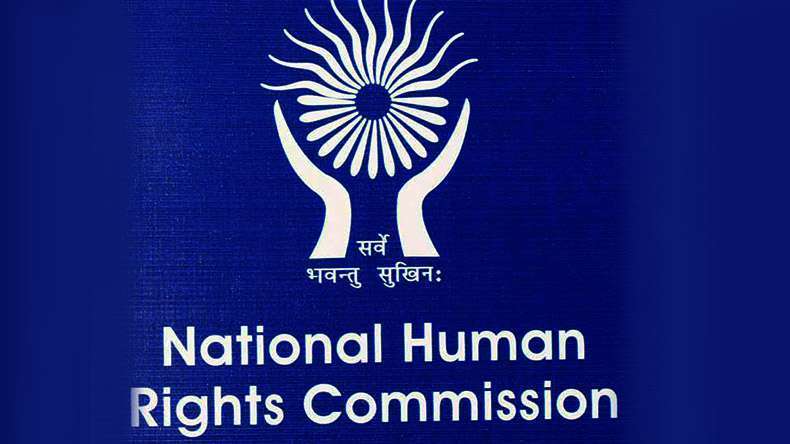
Civil society, human rights defenders, and journalists
- On the 6th of October, five years after a life convict swallowed a suicide note before taking his life inside Nashik Central Prison, the National Human Rights Commission (NHRC) has formed a committee to conduct a “spot investigation” into the matter. The victim, Asghar Ali Mansoori, had named five prison officials in his letter that was ignored at the time of the death with the Maharashtra police refusing to investigate the matter. In the meanwhile, some of the accused prison officials have been transferred to other jails and a few have retired. Following Mansoori’s death in 2020, other convicts had written letters to the Chief Justice of the Bombay high court to denounce the living conditions in Nashik prisons and the ill-treatment prisoners suffered from the prison officials, but no action was initiated on these letters. Dushyant Singh, the Deputy Superintendent of Police deputed at the NHRC, visited the Nashik Prison on the 6th of October and said that the delay in investigation happened due to “non-cooperation” from the state authorities, with the magisterial inquiry report in the case not yet been received after five years. A prisoners’ right activist pointed out that “custodial torture and deaths are difficult to prove. But here, the victim had left a suicide note with clear roles attributed to the accused persons. Yet no action was ever initiated”.
- The Committee to Protect Journalists (CPJ) is asking the Indian authorities to conduct a comprehensive and transparent investigation into the death of journalist Rajeev Pratap. “Authorities in Uttarkhand state should not discount any possible causes of Rajeev Pratap’s death, including his family’s serious allegation that he was targeted for his journalism”, said Kunāl Majumder, CPI’s India representative. “The initial police conclusion that he died of a car crash must not preclude a rigorous examination of the threats made against him. Thos who threaten journalists must be held accountable”. On the 28th of September, Rajeev Pratap’s body was recovered from the Joshiyara barrage on the Bhagirathi river in Uttarkashi district. Pratap ran a YouTube channel named “Delhi Uttarkhand live” and had been missing since the 18th of September. His uncle Kripal Singhh had registered a First Information Report (FIR) at the Uttarkashi police station on the 20th of September under Section 140(3) of the Bharatiya Nyaya Sanhita (kidnapping or abduction with intent to secretly and wrongfully confine a person). In his complaint, Singh alleged that Pratap, known for fearless reporting on local issues, had made several enemies. He claimed the journalist had been pressured to remove a video highlighting poor conditions at Uttarkashi hospital and had no reason to travel towards Gangori on the day he went missing. While the family had alleged foul play, police said Rajeev Pratap met with an accident, after his car fell into the river. Pratap’s wife had said that she had talked to him around 11pm on the day he went missing, after which he was unavailable. “He was telling me that he was feeling anxious after his reports on a hospital and a school. He said many people were calling him, threatening to kill him if the videos were not taken down. At 11.50, I sent a message, and it went undelivered. He was abducted by someone. I am sure he did not just fall off the road” she had alleged.
- On the 17th of October, the Rajasthan Police arrested two journalists from Bhopal, Madhya Pradesh, claiming that they had carried false and defamatory stories against Rajasthan Deputy Chief Minister Diya Kumary. A spokesperson from the news agency defined the police actions as “shocking and unlawful” and said that “our reporting on the corruption allegations involving the Rajasthan Deputy Chief Minister is backed up by proper documentation and verifiable evidence”. The spokesperson added that “this act is nothing short of an attempt to intimidate and silence independent journalism”, and that when their representatives attempted to register an FIR regarding the illegal detention, the police refused to accept their complaint.
Hate Crimes and Hate Speech against Minorities
- On the 4th of October, violence erupted during a religious celebration in Cuttack, Odisha. The incident shocked the residents, as Cuttack is not only known for its secular culture, but also for its communal harmony. The violence saw two groups, one of them including some Muslim boys, fighting a pitched battle with stones and glass bottles. The apparent trigger was the high-decibel DJ music accompanying the Jhanjirimangala Puja Committee’s immersion procession while it was passing through Hatipokhari near Dargah Bazar, an area with Muslim population. A day later, the Vishwa Hindu Parishad (VHP), an Indian right wing Hindutva organisation, issued a call for a strike to protest what it saw as an attack on Hindus. The VHP organised a rally in Cuttack, where they damaged shops and beat up their perceived enemies, leaving 25 people injured. The administration imposed a 36-hour curfew in Cuttack and also suspended internet services, fearing further escalation of violence. Syed Ekram Hussain, former chairperson of Odisha Waqf Board, said “I firmly believe the entire issue is being deliberately given a communal colour. All this talk about members of the Muslim community objecting to songs containing the name of lord Ram during the procession is nonsense. Such songs have been played in the past with no one taking offence”. Hussain said that it was his understanding that the incident began when someone fell during the process over some Muslims boys who, in turn, fell against some shops, damaging them in the process. “It was quickly given a communal colour by those with vested interests”, said Hussain, urging the police to take action against the troublemakers who are out to disrupt Cuttack’s communal harmony.
- On the 14th of October, a Bangladeshi court framed charges against Sunali Khatun, a pregnant migrant worker from West Bengal who, along with her companions, was charged by the Delhi Police as infiltrators and deported to Bangladesh with the help of Border Security Forces (BSF) about four months ago. The Calcutta High Court rejected the Union government’s “infiltrator” claims and ruled that Khatun must be repatriated along with her husband, son and others within a month. However, the Ministry of External Affairs has not yet provided any information on the matter, so there is no certainty whether her child will be born in a Bangladeshi prison or if she will be able to return to the country within the court-mandated timeframe.
- On the 19th of October, Union Minister Giriraj Singh has declared he does not want the votes of the “namak haram”, or the ungrateful, in a remark that appears to be aimed at Muslims weeks before the Bihar assembly elections, triggering widespread political condemnation. Mr Singh said that citizens who accept government welfare have a moral obligation to vote for the ruling party, allegedly referring to Muslims who benefit from PM Modi’s schemes but do not support the ruling party, Bharatiya Janata Party (BJP). Despite facing criticism, the Union Minister stood by his remarks, telling reporters he meant only to highlight that government welfare schemes were non-discriminatory.
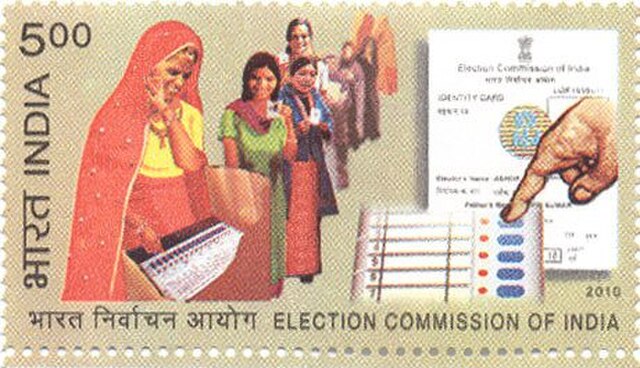
Religious Freedoms and Minority Rights
- On the 7th of October, a day after the Election Commission of India (ECI) declared Bihar’s voter roll “purified,” a report published by The Reporters’ Collective found more than 14.35 lakh suspect duplicate voters and 1.3 crore entries with fictitious addresses. On the same day, an independent analysis published by The Indian Express denounced the exclusion of nearly 80 lakh eligible voters- most of them Muslims- from the final list that will be used for the state’s assembly elections in November. The Reporters’ Collective, which reviewed the final voter lists across all 243 constituencies, found that the systemic issues present in the draft roll remained unaddressed. Their report highlights 14.35 lakh suspected duplicate entries, including 3.42 lakh instances where voters shared identical names, relatives’ names, and ages across multiple voter IDs. Duplicated entries, as well as the exclusion of eligible voters, raise serious questions about the integrity of the SIR process.
- The results of a massive “Special Intensive Revision” (SIR) drive of the electoral rolls conducted by the Election Commission of India in Bihar from June to September 2025 showed voters with Muslim-sounding names being permanently struck off the lists at a higher rate than their non-Muslim counterparts. While Muslims constituted 24.7% of the 65,75,222 lakh voters initially flagged for scrutiny, they accounted for 32.1% of the 323,000 voters who were ultimately confirmed for deletion after a period of ground-level verification. Moreover, the disparity was not uniform across Bihar but was acutely concentrated in the state’s Seemanchal region. This disparity in outcome raises critical questions about the equitable implementation of the ECI revision process. The burden of proof now lies on the Election Commission, who must investigate and explain why a system built on its motto of “no eligible voter to be left out” produced a result that so disproportionately impacted one community in a specific geographic area.
- The names of 22.7 lakh women voters have been deleted in Bihar, a phenomenon that is expected to have its impact on the assembly elections in the state. Out of 3.92 crore male voters, 15.5 lakh names were deleted, resulting to a gender gap in deletions, as male voters saw less deletions as compared to women voters. The deletion of women voters from the electoral rolls comes at a time when the ruling BJP-JDU alliance has emphasised women’s welfare in its agenda.
- The latest report by the National Confederation of Dalit and Adivasi Organisations (NACDAOR)- published on the 10th of October- reveals that, despite repeated claims of development by the government, widespread poverty, high unemployment, inadequate education, and a severe lack of land ownership and proper housing continue to define the life of thousands of Dalits in Bihar. The survey shows that 62% of Dalits in the state are still illiterate, while 63% remain unemployed, surviving on an average monthly income of just Rs 6,480. Ashok Bharti, NACDAOR’s head, stated, “The voices of Dalits are suppressed in every election in Bihar. The real concerns and aspirations of Dalits remain absent from most political agendas”.
- Seven years after being relocated from forest areas in the Nilgiris, dozens of Adivasi (indigenous) families remain without access to basic amenities such as clean water, electricity, and sanitation. The Adivasi families, many of whom were allegedly cheated out of the compensation they received during relocation, were taken advantage of by real estate brokers and some forest departments officials. Following complaints by around 21 families, the District Crime Branch police had registered a case against ten people, including a forest ranger, a forester a lawyer and real estate brokers for defrauding the families who were relocated from the tiger reserve a few years ago. K.Mahendran, district secretary of the Tamil Nadu Tribal People Association, has approached the Tamil Nadu State Commission for Scheduled Castes and Scheduled Tribes with a complaint, asking for justice for the victims of the fraud. Due to his efforts, more than 80 families have been added as victims of the fraud since the original FIR was filed, bringing the total number of victims now to more than 100. Despite this, justice for the communities remains elusive, with no real solutions available to the communities who have been resettled on revenue lands without legal documents proving lands’ ownership.
Internet and Technology
- On the 19th of October, The Wire and Alt News confirmed that the news of Dutch government releasing a stamp to honour the RSS is a deep fake. The incident traces back to the 10th of October, when the Bharatiya Janata Party’s (BJP) official X handle posted a graphic featuring a postage stamp and a representative image of the Rashtriya Swamsevak Sangh (RSS), with written “100 years of selfless service”. BJP IT cell head Amit Malviya, who has been found spreading misinformation several times in the past, had reshared the post the claim that a commemorative stamp was released by the Netherlands government to pay tribute to the RSS on completing 100 years.
- A report published on the 22nd of October by an Indian news website highlights how access to the internet is gradually transforming the lives of workers in the tea gardens of Assam and North Bengal. Through an initiative called Internet Roshni, launched by the Digital Empowerment Foundation, Wi-Fi zones and community internet libraries have been set up in remote tea estates, with local youth and women trained as digital facilitators to help others navigate online spaces. In India, a strong digital divide across rural areas is still present. Only 24% of rural households have access to the internet, compared to 66% in urban areas. Alarmingly, this gap seems to be widening in its usages. Oxfam’s 2022 India Inequality Report (Digital Divide) points out that 31% people in rural areas uses internet in comparison to 67% in urban. The villages in lush tea estates are emblematic of such deep digital divide. People who are still not connected to the internet are often the most disadvantaged, and this lack of access include education, health care and banking. Despite efforts like the Wi-Fi zones, internet is still a luxury for a lot of people.
- On the 25th of October, a revenue minister of the Bharatiya Janata Party (BJP) warned party leaders and workers that their phone calls and WhatsApp conversions were “under surveillance”. He reportedly said, “Every word you speak is being monitored. A single wrong button on your phone can destroy the next five years for the party”. The minister later clarified that he had been referring to WhatsApp groups and messages related to the party’s work. However, the clarification followed criticism from another MP, who described the comments as illegal monitoring and called for the minister’s arrest. The allegedly conducted surveillance has often caused controversy, by for instance the allegations of using Israel-imported Pegasus spyware to hack journalist and activist phones, or the encroachments into citizen privacy through changes to the Information Technology (I-T) Act, Income Tax Act, etc., while simultaneously curbing citizens’ right to know, through laws like the so-called Digital Privacy and Data Protection Act.
Political Parties
- On the 8th of October, the Congress questioned the integrity of the Special Intensive Revision (SIR) of the electoral rolls in Bihar and said that the exercise has raised more questions than answers. In particular, the party said that a preliminary analysis of the final electoral list shows that there were 5 lakh duplicate names, while more than one-tenth of the 67.3 lakh deletions were from 15 assembly constituencies. Following the publication of the final electoral roll after the SIR the electorate in Bihar has shrunk by almost 6% with about 47 lakh net deletions.
- On the 9th of October, leader of the opposition party Rashtriya Janata Dal (RJD) and former Bihar deputy chief minister Tejashwi Yadav announced that if his party is voted to power in the upcoming assembly elections, a law will be brought to ensure that every family in the state has one government job. He specified a timeline: after forming government they will pass the legislation within 20 days, and within 20 months to ensure that no household in Bihar remains without a government job. Yadaw argued that the promise is backed by data from a survey his party has conducted and claimed is not mere rhetoric but actionable. He cited his record of providing five lakh government jobs in 17 months during the previous government as proof of feasibility. The announcement came shortly after the ruling NDA government launched cash transfer schemes for women.
- On the 21st of October, Jan Suraaj Party founder Prashant Kishor accused the Bharatiya Janata Party (BJP) of allegedly pressuring three of his party’s candidates to withdraw their nominations for the upcoming Bihar assembly elections, directly naming Union home minister Amit Shah and Education Minister Dharmendra Pradhan, appointed as the party’s election in-charge for Bihar. The Bihar assembly elections will be held on the 6th and 11th of November. The counting of votes is scheduled for the 14th of November.
- On the 27th of October, the Election Commission of India has announced a nationwide Special Intensive Revision (SIR) of electoral rolls in 12 states and Union territories. Addressing a press conference, Chief Election Commissioner (CEC) Gyanesh Kumar said that after the completion of Phase 1 of SIR in Bihar, this will be the second phase. Kumar said all poll-bound states and union territories in 2026 will be part of the SIR, which include Kerala Puducherry, Tamil Nadu and West Bengal. The draft roll would be published on December 9, and the final electoral roll will be released on February 7, 2026. The other states and Union Territories are Andaman and Nicobar Islands, Chhattisgarh, Goa, Gujarat, Lakshadweep, Madhya Pradesh, Rajasthan, and Uttar Pradesh. Training of polling officials for Phase-II of SIR will begin on Tuesday, the CEC said, adding that each officer will visit every house thrice to avoid any bogus voters. “The SIR will ensure no eligible elector is left out and no ineligible elector is included in poll rolls,” he said.
Police and authorities
- On the 10th of October, a protest march in Perambra, a town in the district of Kozhikode in the state of Kerala, turned violent, following which the Kozhikode police registered a case against Vadakara MP Shafi Parambil and more than 600 Congress party workers. Congress workers alleged that Shafi Parambil, MP, was beaten up by police, and he sustained injuries to his nose, leading to an emergency surgery. The First Information Report (FIR) was registered under multiple sections of the Indian penal code, including those related to rioting, unlawful assembly and deterring public servants from their duty by assault or criminal force. The clashes erupted following strong political tensions after the college union election at CKG Government College, Perambra. Congress leaders alleged that the assault on MP Shafi Parambil was politically motivated and declared that they will stage a series of protests across the State to expose the police officers involved in the incident.
- On the 18th of October, student groups staged a protest at Jawaharlal Nehru University (JNU) demanding registration of an FIR against ABVP (a student wing of Rashtriya Swayamsevak Sangh, a right-wing Hindutva and nationalist organisation) on allegations of violence. The protest turned violent, with the organisations accusing Delhi Police of brutal assault. The All India Students’ Association (AISA) said that several students were “brutally beaten up” and allegedly detained by police when they attempted to march to the Vasant Kunj police station. The Students’ Federation of India (SFI) also alleged that the police “pulled female students by their hair and manhandled them, including by male personnel. The Deputy Commissioner of Police denied the allegations.

Judiciary
- On the 7th of October, the Supreme Court issued a notice regarding a petition asking for the removal of an AI-generated video posted on X by the Assam’s BJP unit. The video, “Assam without BJP”, was posted on the 15th of September and depicts a scenario dominated by Muslims in the case of a BJP’s loss at the elections. Congress’s media department chairperson Bedabrat Bora, who filed the petition, declared that the vide spreads fear and hatred against Muslims, and the Congress claimed that the video is intended to spread communal violence. The bench of judges of the Supreme Court has now set the hearings for the 28th of October.
- On the 27th of October, the Supreme Court expressed displeasure over the Delhi Police’s failure to file counter-affidavits to the bail pleas of activists Umar Khalid, Sharjeel Imam, Meeran Haider, Gulfisha Fatima, and Shifa-ur-Rehman in the larger conspiracy case linked to the 2020 Delhi riots. During the hearing, advocates of the accused highlighted that their clients had spent nearly five years in custody while the trial had been progressing at an extremely slow pace. “The whole case is about the delay in the trial. There should not be further delay in the hearing”, one of the advocates submitted. Accordingly, the Bench nudged the Delhi Police to consider granting bail on concession, especially in view of the prolonged incarceration and the delay in the trial. The court had previously been unable to hear the matter on two occasions in September.
Business & economy
- On the 8th of October the Bombay High Court dismissed Anil Ambani’s petition challenging the State Bank of India’s (SBI) decision to classify the loan account of Reliance Communications (RCom) as “fraud”. The court held that as RCom’s promoter, Ambani could not escape liability for the company’s actions. Ambani had argued that he was not involved in the day-to-day management of RCom and that the decision violated principles of natural justice, but the court rejected these claims. It ruled that written objections were sufficient and that there was not requirement for a personal hearing. With this decision, the High Court upheld SBI’s classification of the account as fraudulent, reinforcing stricter standards of corporate responsibility in India.
- A draft notification issued by the Ministry of Environment proposes exempting standalone cement-griding units from the requirement of a detailed Environmental Impact Assessment (EIA) and public hearing under the Environment (Protection) Rules, 1986, a move that would significantly ease environmental clearance for such projects by allowing them to proceed on a simplified evaluation process. This change comes as the Adani Group seeks approval for a 6 million-tonne-per-annum cement-grinding plant near Kalyan in the Mumbai Metropolitan Region. Local residents and environmental groups have opposed the project, citing potential air, dust, and water pollution, as well as threats to the area’s ecological balance and public health.
- On the 10th of October, the US Securities and Exchange Commission (SEC), which is probing alleged security fraud and USD 265 million bribery scam against Adani Group executives, told the court that Indian authorities have failed to act on its requests to serve summons and complaints to Adani Group executives. In 2024, prosecutors of Brooklyn indicted the Adani group of allegedly bribing Indian officials to buy electricity produced by Adani Green Energy, a subsidiary of the Indian conglomerate. The SEC complaint claimed that the Indian executives who benefitted from the bribes then “misled” US investors about the company’s anti-graft practices by providing falsely reassuring information. On the 10th of October, the SEC told a New York district court it had repeatedly contacted India’s law ministry in its attempt to serve legal documents to Adani group founder Gautam Adani and his nephew Sagar Adani. The latest communication with the ministry was on the 14th of September, but no confirmation of delivery has been acknowledged, the SEC said. “The SEC will continue communicating with the India Ministry of Law and Justice and pursuing service of the defendants via the Hague Service Convention,” the SEC filing said.
- An industry-wide survey has revealed that, following the imposition of 50% tariffs by the US President Donald Trump on Indian goods, the country’s textile and clothing exporters have witnessed an equivalent 50% drop in their US businesses with inventories piling up and orders getting delayed. Around two-third of the respondents revealed that they had to offer discounts up to 25% to remain competitive. Around 82% of the exporters also have to deal with an extended credit cycle across the supply chain owing to the tariffs. The survey also indicates that around 40% of respondents saw a rise in working capital requirements by more than 30%, which reflects the increasing financial burden within the sector. The US is the single-biggest market for India’s textile and apparel, making the tariffs extremely burdensome for the sector.

